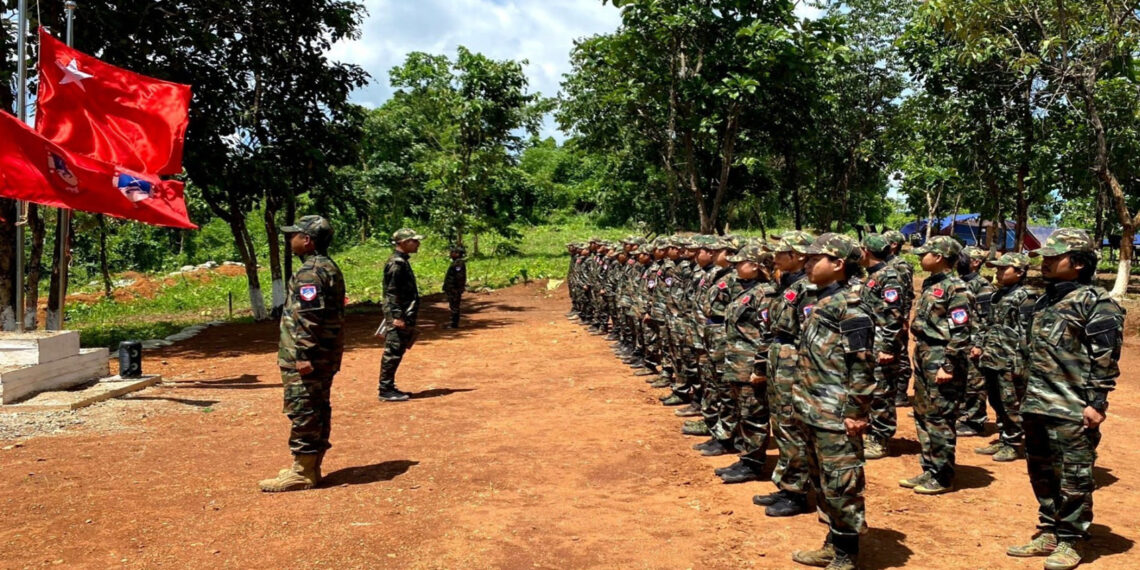Myanmar rebel group accuses India of killing and torturing its fighters in Manipur
The exiled National Unity Government slammed the summary killing of members of a local defence force by the Assam Rifles in Manipur, a state in north-eastern India affected by ethnic violence for the past two years. Indian authorities claim the dead were “armed extremists" and that they seized a trove of weapons. Myanmar’s resistance movement calls for an investigation into the incident and the suspension of fence construction along the Indo-Myanmar border.
Yangon (AsiaNews) – Myanmar's National Unity Government (NUG), which includes all the forces opposed to the country’s military junta, has called for an investigation into the death of 10 members of a local defence group killed by a battalion of the Assam Rifles, an Indian paramilitary force active in the northeastern state of Manipur.
According to Myanmar's government-in-exile, an operation on 14 May by the Assam Rifles in Chandel District led to the death of 10 members of Local Defence Forces (LDF), also known as Public Protection Teams (PDTs or PaKaPha), not to be confused with the People's Defence Forces (PDFs). The latter are loyal to the NUG, which is mostly made up of exiled Myanmar lawmakers opposed to the country’s military junta.
In particular, the PDT involved in the latest incident was active in Tamu, a township in Myanmar’s Sagaing Region, and mainly responsible for local policing and supporting the PDFs.
The NUG says that the men did not die in an armed clash, but were captured, tortured and summarily executed by Indian forces. Indian authorities claim instead that Indian forces responded to an armed attack.
According to the NUG’s version of events, the 10 PDT members had previously been in contact with Indian authorities to report their location near the border. On 16 May, however, the Assam Rifles returned their bodies to Myanmar’s resistance forces.
The NUG said that the fighters were forced to sign a document acknowledging that they had crossed Indian territory and launched an attack, as well as pledging not to oppose the construction of future border fences.
“I can confirm that there was no fighting. They were not posing any threat to India’s security,” said NUG Foreign Minister Daw Zin Mar Aung. “It was an ugly incident for the Indian military and we are concerned that bilateral relations will be harmed.
“There is a need to uncover the truth and ensure justice in a manner that does not harm bilateral ties. We have discussed the matter with the Indian authorities, demanded justice and urged them to find the best solution. I hope India will cooperate,” she added.
The Indian Army's Eastern Command reported instead a military operation (described as one of the "biggest" in recent years) acting on specific information regarding the movement of "armed cadres" near the village of New Samtal, Chandel District.
During the operation, “armed extremists” allegedly attacked the Assam Rifles who responded in a “calibrated and measured” manner, killing 10 individuals in camouflaged fatigues.
Subsequently, a significant cache of weapons was recovered, including seven AK-47 rifles, one RGP launcher, one M4 rifle and four single-barrel breech loading (SBBL) rifles, ammunition, and other warlike stores, the Indian Army reported.
This has been disputed because most PDFs face chronic weapons shortages, and have allied themselves with better equipped ethnic militias to fight the military regime.
The Indian press release notes that the “neutralized individuals were known for involvement in cross-border insurgent activity. Efforts are underway to confirm their identities.”
Local sources report that the area where the operation took place is characterised by difficult terrain and poor connectivity, which has complicated communications and recovery operations.
Several photos circulating online show bodies with obvious signs of torture. However, as The Diplomat reports, it is unclear why the Assam Rifles would have carried out such atrocities.
Located along the border between India and Myanmar, Chandel District is known for the presence of armed groups and ethnic tensions between local communities. It is inhabited mainly by Kuki groups, on both sides of the border.
For a local ethnic Kuki official, “the chances of those killed belonging to our community are very low.” But it is public knowledge that some Kuki groups have forged ties with Myanmar's ethnic militias to fight against the military junta.
Meanwhile, violence broke out in Manipur in May 2023 pitting minority Kuki and majority Meitei. As a result, New Delhi imposed the presidential rule on the state, and dispatched troops but has failed so far to stop clashes between armed groups.
The NUG has also expressed concern about the increase in tensions in Tamu Township, in Myanmar, blaming border fence construction by Indian authorities. The latter has been going on ignoring border negotiations with Myanmar.
Following the coup in February 2021, many of the members of the previous government, led by democratic leader Aung San Suu Kyi, were forced into exile where they set up the NUG, which has no control over Myanmar territory. Its PDFs have been fighting the country’s military together with several ethnic militias that have controlled for decades certain areas inhabited mostly by ethnic minorities.
30/09/2024 13:50
19/02/2025 18:27







.png)










